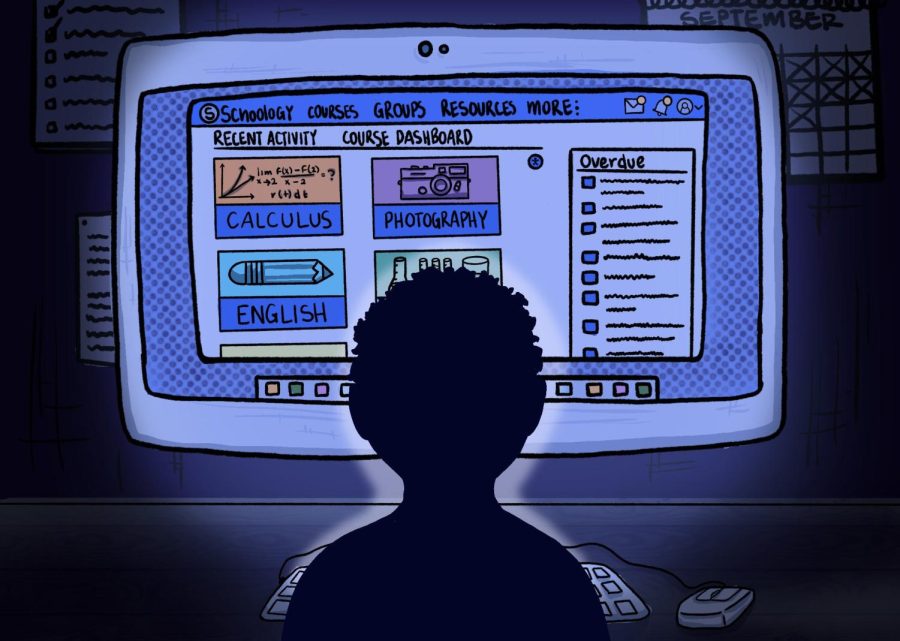From Bedrooms to Classrooms
The online classroom has transformed traditional education in measures that have drastically impacted the learning environment at CHS.
Turning in a paper at 11:59 p.m. is something that would have never occurred before online learning platforms. Adorned with deadlines and a bird eye’s view of the coming week’s assignments, Schoology is the program that Ann Arbor Public Schools (AAPS) adopted during the pandemic.
Schoology is an online learning platform that the district implemented for the 2020-2021 school year. Each individual course has a section with all of the materials that students need for daily instruction. Slide shows, homework and lectures can all be found on the pages.
CHS FOS teacher Courtney Kiley doesn’t agree with the district’s decision to continue to use Schoology when students are in the building. She believes that students fall into two different categories: they don’t understand how to use the platform and it is not intuitive to them or they are continuously checking it.
“I think that it makes kids obsessed with tracking their grades and every single assignment that they miss,” Kiley said.
Although Kiley believes in the benefits of an organized way of learning, she doesn’t think that Schoology is the answer to disorganization. There is something about completing assignments on paper and having to write things down that she feels can never be replicated on Schoology. Typing things out doesn’t help kids remember the material that they are learning as much as it would if they were writing, according to Kiley.
Kiley believes students that didn’t come from AAPS’s middle schools are at a disadvantage.
“We just expect them to come into ninth grade knowing how to use this platform,” Kiley said. “And every teacher kind of organizes it differently or some teachers not at all and I think it’s just too confusing.”
In contrast, CHS sophomore, Elle McCreadie believes Schoology works well once you overcome the learning curve. Considering that she was facing Schoology for the first time with all of her peers, the learning curve wasn’t as steep. After months on end of using the platform, she has started to develop an understanding of how it works.
With the countless hours spent on computers, the freedom to open new tabs on their laptops has had a clear impact on McCreadie’s classmates. She has noticed that the level of distraction among her peers has skyrocketed since the introduction of an online curriculum.
“Because you have your computer out [all the time], it’s really easy to play online games or do work from other classes, or whatever else I need to do,” McCreadie said.
According to CHS Dean Marci Tuzinsky the decision to use Schoology was made before the virtual school year began. The district had been planning on implementing the platform pre-Covid, but the plan was accelerated after the pandemic brought the district online. The district plans to continue to use Schoology for years to come as they have signed a contract with the company.
According to Dean Tuzinsky, the AAPS administration hoped that Schoology would be an easy way for students and parents to be able to access work easily, especially when kids were sick and missing school. The ‘colored folder system’ was implemented for each teacher to utilize in their online classroom to help students stay on pace and follow along.
When the platform was first implemented it became clear that the district ITD department needed someone who understood both the technology and what it was like as a teacher using the technology. Thus, a “high school huddle” group was formed during the beginning of the pandemic consisting of some teachers in the teacher’s union, some principals from the district including Dean Tuzinsky, and some people at the district level.
“We would meet every week to see what problems were bubbling up,” Dean Tuzinsky said. “It was like starting a whole new school – we didn’t know what problems to anticipate.”
Tuzinky’s background as a high school math teacher who had used Powerschool for grading in the past and a computer science major helped her and the group figure out how to make the platform work for everyone in the district.
To this day, one of the biggest issues teachers are continuing to have is the syncing of grades between Schoology and Powerschool. Dean Tuzinksy is continuing to advocate for a solution to this problem and just recently met with an administrator – whose job is solely to be in charge of Schoology– to discuss the frustrations teachers are still having.
“We have this contract with Schoology and we have a contract with PowerSchool,” Tuzinsky said. “ We need to use our leverage as a big school district to ask those systems to write some programs that will make this easier for teachers.”
















